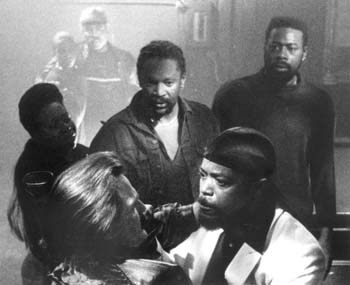Brooding Billiards
Pool Hustlers: Things aren't peaceful at the Crabtree pool hall, where TC (Kelvin Han Yee) is set up for a high-stakes billiards match with a gifted professional pool shark.
Filmmaker Rob Nilsson's murky pulp fiction
By Richard von Busack
A neurotic small-time pool hustler named TC (Kelvin Han Yee) is gradually set up, in both senses of the phrase, for a high-stakes billiards match with a murderously gifted professional. That's the simple story of Chalk, the newest feature film by the San Francisco-based independent filmmaker Rob Nilsson.
Seeing just a few minutes of Chalk reveals Nilsson's talent in setting up a mood. Almost the whole film takes place in the shadows of crimson, neon-illuminated night. Four-fifths of the picture is shot within spitting range of a pool table. The few exteriors are almost all monsoon-drenched. There's more rain in Chalk than there is in Blade Runner.
The narrative, however, doesn't live up to the lighting. The plot synopsis is best gleaned from the back-story outline on the film's Web site (www.chalkfilm.org). I saw the movie, and I can't tell you if TC is the natural or the surrogate son of the pool-hall owner Watson (Edwin Johnson), or if TC is a half brother or full brother to Jones, his angry, jealous sibling. (Apparently, Jones is half-Korean. He's Watson's son, fathered during his time overseas in the Korean War. TC is Watson's adopted Chinese son.)
The Crabtree pool hall, where the main characters hang out, is in Richmond in Contra Costa County. It stands, surrounded by wrecker's yards, on Cutting Boulevard, as close to the freight-train tracks as the building code allows. Inside this windowless shack, TC practices his shooting. He supports himself by engineering minor hustles like a $100 bet he wins against some slumming kids from Orinda.
Things aren't peaceful at the Crabtree. Watson's other children are pestering him either to fix up the joint or to sell it. Lois (played by the sultry Denise Concetta Cavaliere), Watson's employee, both the barkeep and bookkeeper, is TC's lover, and she's using that leverage to pressure the pool player to make something of himself. Like Watson and Jones, Lois is pushing TC to start taking on some serious pool players, but TC's nerves keep him away from more serious challengers. It's only when Watson's health begins to fail that TC succumbs, with many misgivings, to the family pressure. A match is scheduled between TC and the fearsome pool shark Dorian James.
Nilsson uses vividly colored nightscapes for the settings and a cast of nonprofessional actors who are as vivid as the neon out the window. (One dazzling interior shot seems to be lighted by nothing besides the oversized neon cocktail glass on the marquee of the 500 Club on Guerrero Street). One of the most significant things about Chalk is that it's performed by an acting group for the homeless, the Tenderloin Action Group. On the whole, despite the film's limitations, the acting isn't the problem with this independent film. The characters look properly desperate and edgy.
But the plot isn't quite as tangible as Nilsson's images. The moral dilemma is as clearly black and white as any studio picture. TC has to play pool to help his dying father. His opponent, James, has no redeeming qualities except self-pity.
James is played by Don Bajema, who co-wrote the screenplay. Bajema has previously collaborated with Nilsson as an actor in Heat and Sunlight (1988). As a novelist (Reach, Boy in the Air), Bajema has appeared on the same rock-star/writing circuit as Henry Rollins, Lydia Lunch and Jim Carroll.
His script is full of rock-lit's familiar bluster and visceral grab, which at times work--as in a scene where a tip on how to bet on pit bulls sums up TC's character. At worst, the script is recycled hard-boiled patter: pulp-fiction repulped. Chalk is a difficult watch; there's a high misery index in this film, and it requires concentration to piece together who's who.
But the film only becomes really impossible in the scene of James (Bajema, overacting up a storm) preparing for the big match by demanding that his girlfriend ram his own pool cue up his butt. Ritual? Sacrifice? Punishment? Personal kink? Showing off, is my guess. The scene sticks out of Nilsson's neorealist film like--well, it sticks out like a pool cue out of an actor's butt.
Since Nilsson's made public his dislike of Quentin Tarantino's movies, it's strange how some very clichéd Tarantino qualities are brought out in the ending of Chalk. This naturally downbeat film goes from art to artificial in a quick act of unlikely violence followed by a three-way Mexican standoff with pistols. Nilsson's tough-mindedness and low output are the marks of a dedicated artist; he's released only five feature films in the last 20 years. He's popular on the festival circuit, having nabbed honors at Cannes and Sundance.
Nilsson's best-known film, the Signal Seven (1985), is depressing, but it has integrity. It faces the middle-aged misery of a taxi driver who realizes that he isn't an actor working as a cabbie anymore--he's a cabbie pretending to be an actor. The Chalk Web site lists four films Nilsson has in postproduction--with luck, these unfinished projects will contain writing to match the solid street authenticity of his images.
[ San Francisco | MetroActive Central | Archives ]
Copyright © Metro Publishing Inc.
![]()

Diana Smith
Chalk (Unrated: 134 min.), directed by Rob Nilsson, written by Nilsson and Don Bajema, photographed by Mikey Freeman and starring Edwin Johnson, Denise Concetta Cavaliere and Kelvin Han Yee.
From the October 5-18, 1998 issue of the Metropolitan.
![[MetroActive Movies]](/movies-arts-entertainment/gifs/movies468.gif)